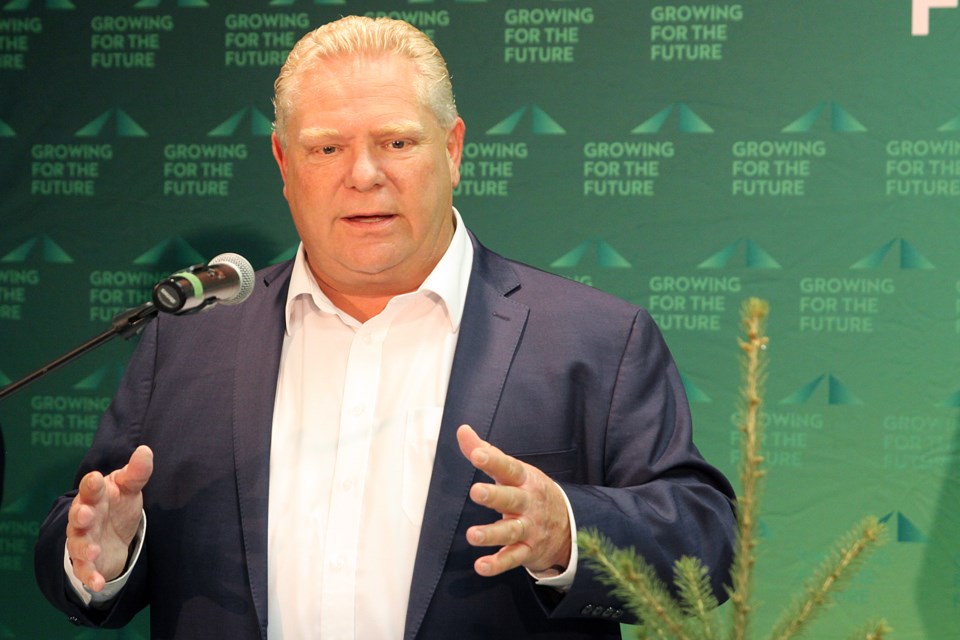THUNDER BAY – Premier Doug Ford doesn’t seem to have any regrets about his government’s decision to wind down the basic income pilot project.
Within weeks of being swept into power, the premier’s fledgling Progressive Conservative government announced it would be prematurely ending the program, originally designed to be a three-year experiment which provided a guaranteed monthly income to eligible participants in Thunder Bay, Hamilton, Lindsay and Brantford.
During a Thursday morning visit to the Resolute Forest Products pulp and paper mill in Thunder Bay, Ford was asked about what he would say to those who were affected by the decision to prematurely end the program.
“The best way to help people out of poverty is something called a job,” Ford said, pointing to the opening of a mine in the White River area as well as the announcement by Resolute Forest Products of increased investment into its Northwestern Ontario operations.
“That’s the way you get people out of poverty, is making sure you support them and give them a hand up.”
Ford also said the program was too expensive, pointing to the $17 billion number produced by his government for the cost if the income supplement was to be expanded and implemented across all of Ontario.
A single person enrolled in the program would receive up to $16,989 per year with up to $24,027 per year for a couple, less 50 per cent of any earned income. Individuals living with a disability were receiving an additional $6,000 per year. The government has said payments will end in March 2019.
Nearly 40 people gathered outside the mill property to protest a variety of issues including basic income, Ford’s looming fight with the federal government over carbon pricing and cuts to mental health funding previously promised by the former Wynne Liberal government. None of those waiting were given an opportunity to speak to the premier.
Angie Lynch, who described herself as an ally of those in the basic income program and had worked with people who had lived in poverty, said she could see the improvement in the lives of the people who had been receiving the guaranteed income.
“We are angry. We’re frustrated because we have a lot of issues in our community that need to be addressed. I would ask him to come take a walk with me for a day in Thunder Bay and come and meet the people his policy changes have affected,” Lynch said.
“We were really hoping he would have at least consideration for the people he’s supposed to represent to stop and talk to us, hear our message and listen to what we have to say to him.”
Since taking office, Ford has committed $25 million to Toronto for law enforcement to combat growing gun and gang crime in Ontario’s largest city.
Thunder Bay police officials have warned that out of town gangs, mainly from the Toronto and Ottawa areas, have been travelling to Northwestern Ontario to establish a presence to take advantage of the city’s lucrative illicit drug trade.
Acting city police chief Sylvie Hauth said she has requested funding from the province for additional resources to crack down on the escalating violent organized crime.
“If the Thunder Bay police chief needs a little bit of support we would always be open to sitting down and talking to them,” Ford said, adding he would have to talk to Community Safety and Correctional Services Minister Michael Tibollo. “We have to start getting rid of these guns and gangs and drugs on the streets. I can’t stand them.”
The premier seemed receptive when asked about whether the ongoing twinning of the Trans-Canada Highway between Thunder Bay and Nipigon, which is about halfway finished, would be continued to the end. That was a project started years ago by his predecessors and championed by local Liberal MPP Michael Gravelle.
“We’re working on that right,” Ford said, adding to expect word from Transportation Minister John Yakubuski in the next week or so. “It’s very important to have infrastructure.”
